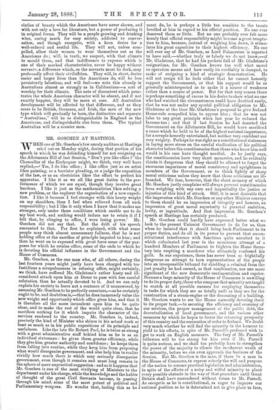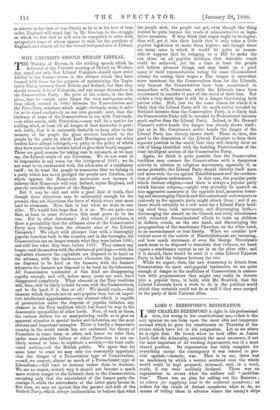MR. GOSCHEN AT HASTINGS.
WHEN one of Mr. Goschen's few unruly auditors at Hastings cried out on Monday night, during that portion of his speech in which he was defending himself for not resigning on the Allotments Bill of last Session, "Don't you like office ?" the Chancellor of the Exchequer might, we think, very well have replied,—' Yes, I do like office ; I like office just as an artist likes painting, or a barrister pleading, or a judge the exposition of the law, or as an electrician likes the effort to perfect his apparatus. I like it as we all like great duties to the per- formance of which we are equal, though they involve great burdens. I like it just as the mathematician likes solving a new problem, or the explorer the organisation of a new expedi- tion. I like it because I feel stronger with this heavy weight on my shoulders, than I feel when relieved from all such responsibility ; but I like it only when I know that it makes me stronger, only under those conditions which enable me to do my best work, and nothing would induce me to retain it if I felt that, by clinging to office, I were losing power.' Mr. Goschen did not say that. But the drift of his speech amounted to that. For first he explained, with what some people may think almost unnecessary fullness, that he is not holding office at the sacrifice of principle imputed to him; and then he went on to expound with great force some of the pur- poses for which he retains office, some of the ends to which he is devoting his official influence in the Government and the House of Commons.
Mr. Goschen, as the one man who, of all others, during the last fourteen years might justly have been charged with too fastidious a scrupulousness in refusing office might certainly, we think, have suffered Mr. Gladstone's rather hasty and ill- considered attack upon him at Dover to pass with less careful refutation than he actually devoted to it. And we can only explain his anxiety to leave not a sentence of it unanswered, by assuming Mr. Goschen to be perfectly conscious,—as he certainly ought to be, and doubtless is,—that he does immensely value the new weight and opportunity which office gives him, and that it is therefore all the more incumbent upon him to be quite clear, and to make the rest of the world quite clear, that he sacrifices nothing for it which impairs the character of the services rendered to the country. Mr. Goschen is, indeed, precisely the kind of Minister who shines in his actual work at least as much as in his public expositions of its principle and usefulness. Like the late Sir Robert Peel, he is twice as strong with a great administrative staff behind him as he is as an individual statesman : he gives them greater efficiency, while they give him greater authority and confidence ; he keeps them from falling into routine, while they keep him from proposing what would disorganise government, and also help him to realise vividly how much there is which may seriously disorganise government, even though it remains and must long remain in the sphere of mere unpractical suggestion : and so it happens that Mr. Goschen is one of the most vivifying of Ministers to the department under his charge, while the knowledge and the habits of thought of the great Civil Servants become, in passing through his mind, some of the most potent of political and Parliamentary weapons. No wonder that, feeling this as he must do, he is perhaps a little too sensitive to the taunts levelled at him in regard to his official position. No one ever deserved them so little. But no one probably ever felt more keenly that official responsibility might become a great tempta- tion to him, because, instead of weighing him down, it stimu- lates his great capacities to their highest efficiency. No one will ever say of Mr. Goschen, as Lord Palmerston is reported to have said,—whether truly or falsely we do not know,—of Mr. Gladstone, that he had his pockets full of Mr. Gladstone's resignations, for Mr. Goschen knows too well what moral co- operation means and how easily its cordiality is damped, to make of resigning a kind of strategic demonstration. He will not resign till he feels either that he cannot honestly support the Government, or that his support would be so generally misinterpreted as to make it a source of weakness rather than a source of power. But for that very reason there is perhaps something of excess in his desire to show what no one who had watched the circumstances could have doubted easily, that he was not under any special political obligation to Mr. Gladstone at the time Mr. Gladstone's proposal to give Ireland Home-rule compelled him to oppose him ; that he was not false to any great principle when last year he reduced the Income-tax ; and that if last Session he had deserted the Government on the Allotments Bill, he would have sacrificed a cause which he held to be of the highest national importance, for a scruple honestly entertained, but neither very confident nor very weighty. Perhaps he was right as a constitutional statesman in laying more stress on the careful vindication of his political character before the constituencies than those who know him well would in his case have thought needful. As he justly says,. the constituencies have very short memories, and he evidently thinks it dangerous that they should be allowed to forget the enormous importance of moral consistency and uprightness in members of the Government, or to think lightly of sharp moral criticisms unless they know that those criticisms are ill- founded. We fear, however, that the short memory of which Mr. Goschen justly complains will always prevent constituencies from weighing with any care and impartiality the justice or injustice of this kind of attack. Still, it is most desirable that the impression which Mr. Goschen or any other Minister conveys to them should be an impression of integrity and honour, an impression of great moral superiority to personal ambition, levity, or ingratitude. And that impression Mr. Goschen's speech at Hastings has certainly produced.
Mr. Goschen could hardly have expressed better what we look to the present Unionist Government to do for us, than when he insisted that it should bring back Parliament to its proper duties, and do all in its power to prevent that uncon- stitutional interference with functions quite unsuited to it which culminated last year in the monstrous attempt of a, hundred Members of Parliament to frighten the Home Secre- tary into respiting a murderer who ultimately confessed his guilt. In our experience, there has never been so frightfully dangerous an attempt to turn representatives of the people into an irresponsible tribunal for shielding a criminal from the- just penalty he had earned, as that combination, nor one more' significant of the new democratic sentimentalism and caprice. Because a large minority of the House of Commons is unwilling to do its proper duty, those who compose that minority are taught' to snatch at all possible excuses for employing themselves
in tasks for which they are as totally unfit as they are for the construction of a steam-engine or the decorating of a building.
Mr. Goschen wants to see the House earnestly devoting itself to its proper task,—to securing the efficiency and economy of our services, the proper management of the public debt, the decentralisation of local government, and the various other measures by which he hopes to foster the returning prosperity of this country and the restoration of order to Ireland. We doubt; very much whether he will find the minority in the humour to. yield to his efforts, in spite of Mr. Parnell's professed wish to get to work on English measures. The fury of Mr. Parnell's followers will be too strong for him even if Mr. Parnell is quite serious, and we shall too probably have to strengthen the power of the majority to silence the incoherent wrath of' the minority, before we can even approach the business of the
Session. But Mr. Goschen is the man, if there be a man in the House of Commons, to express soberly the will and purpose
of the nation to resume practical legislation and administration, in spite of the efforts of a noisy and wilful minority to plant every possible obstacle in the way of that procedure until Great Britain shall have surrendered without terms to Mr. Parnell. As energetic as he is constitutional, as eager to improve our national position as he is determined not to give place to foes, as sincere in his love of true liberty as he is in his love of true order, England will stand fast by Mr. Goschen in the struggle on which we fear that he will soon be compelled to enter with antagonists some of whom appear to wish for the paralysis of England, and almost all for the virtual independence of Ireland.



















































 Previous page
Previous page